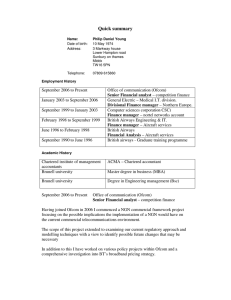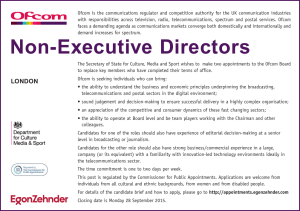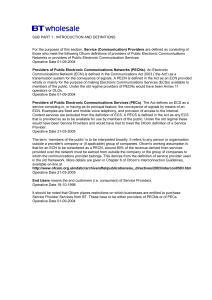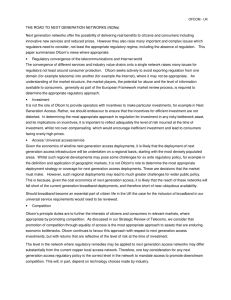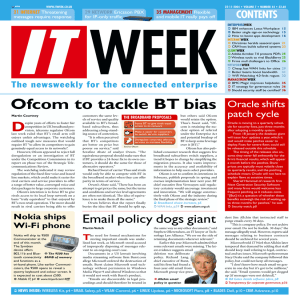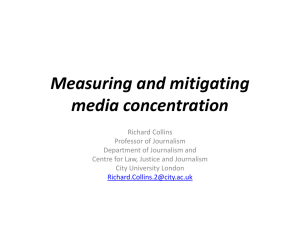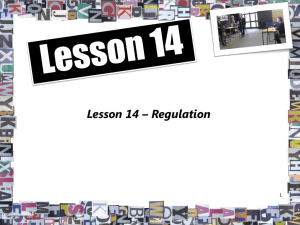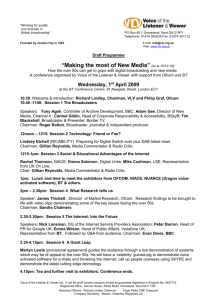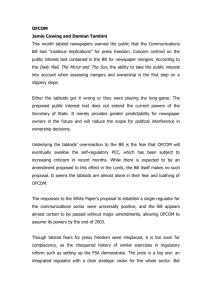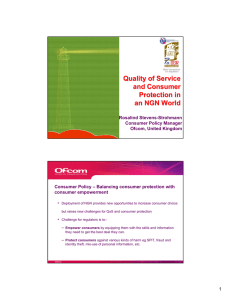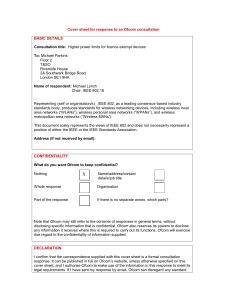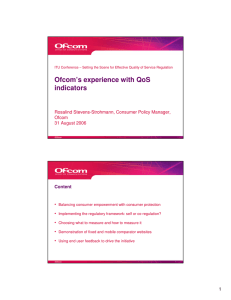Liz Greenberg, Numbering Project Manager, Ofcom
advertisement
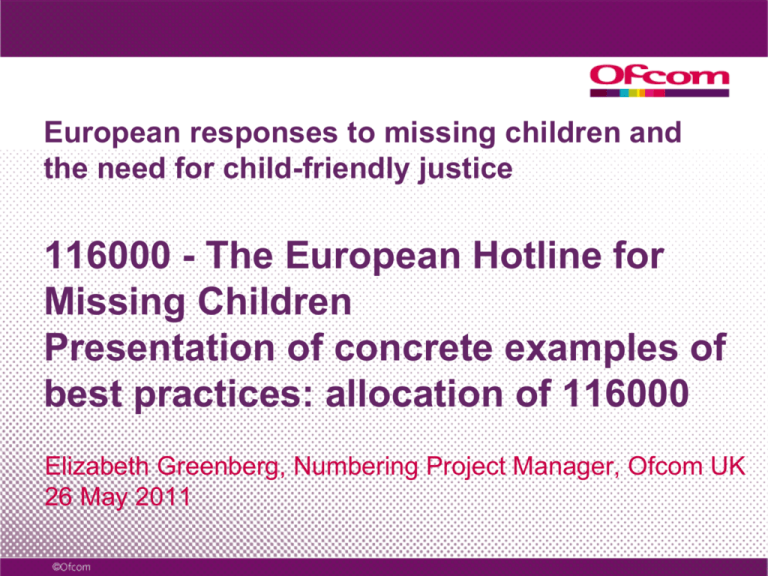
European responses to missing children and the need for child-friendly justice 116000 - The European Hotline for Missing Children Presentation of concrete examples of best practices: allocation of 116000 Elizabeth Greenberg, Numbering Project Manager, Ofcom UK 26 May 2011 Agenda • Section 1 – Challenges for the allocation of 116000 • Section 2 – Creating a new allocation process for 116 numbers • Section 3 – The service provider selection process • Section 4 – Comparative selection process - detail • Section 5 – Creating a regulatory environment to encourage service provision on 116000 • Section 6 – What we have found to be ‘best practice’ in the allocation of 116000 • Section 7 - Contact details and links to background information 1 Challenges for the allocation of 116000 • Need to ensure “best use” of the 116000 number – in response to the social value of the Commission’s initiative on 116 numbers – to promote the interests of citizens and consumers and meet our UK-community requirements • Unique situation for number allocation – only one 116 number reserved for each type of harmonised service of social value – potentially a number of service providers interested in acquiring the number – merits of the potential service provider important – need a process that will select the most suitable service provider(s) • Need to create the best regulatory environment to encourage service providers to apply for and provide a service on 116000 – call charging and funding important considerations 2 Creating a new allocation process for 116 numbers We decided that the unique nature of 116 numbers required a specific allocation process as: • our usual ‘first come first served’ process was not the most suitable method of selecting appropriate service providers • we needed to consider the merits of the service provider as well as the communications provider – and make a joint allocation and setting of obligations • each 116 number has specific service criteria to be incorporated into the eligibility assessment process • we wanted to allow allocation to a partnership of service providers if in the interests of consumers (e.g., to ensure 24-hour and/or UK-wide coverage) Selection of the most suitable service provider required knowledge and experience outside of the core areas of Ofcom’s (the communications regulator) competence therefore: • we needed to seek advice from an independent source 3 The service provider selection process We needed a selection process that could determine the most appropriate service provider without being over burdensome on the applicants, Ofcom and those who advised us We worked with prospective applicants for the first three 116 numbers to develop the process, including Missing People (the allocatee of 116000 in the UK) Comparative selection process • Selection process run specifically for 116000 • Two stage application process • Detailed guideline documents provided to assist the service provider • Prospective applicants indentified and contacted. Meetings held to help guide the applicants through the process • Cross-Government Advisory Committee, consisting of Government and nonGovernment experts on helplines and services of social value, created to assist Ofcom assess the applications and ensure high standards in service provision 4 Comparative selection process - detail Stage One • process document published, including application form requesting factual information on current or prospective service provision • Advisory Committee assessed applications against the ‘Service Eligibility Criteria’ and recommended to Ofcom which service providers should proceed to Stage Two Stage Two • submission of a five-year business case for providing the service • attendance at a ‘Discovery Session’ with Ofcom and the Advisory Committee, including a presentation of business case and a question and answer session • Advisory Committee recommends which service provider (or service provider partnership) should be allocated the 116 number. (If none suitable, the number is not allocated at this time.) • Advisory Committee may advise on additional criteria to ensure certain standards of service provision (e.g., efforts towards language translation) • The selected service provider chooses its preferred communications provider and the number is allocated 5 Creating a regulatory environment to encourage service provision on 116000 Charging arrangements for 116 numbers • may be ‘freephone’ (chargeable with an announcement) or ‘free to caller’ (always free) • decided on a service-by-service basis • use a set of criteria to determine if service is of: – ‘social value’ = ‘freephone’; or – ‘extreme social value’ = ‘free to caller’ • 116000 is determined as being of ‘extreme social value’ based on the service’s level of social value/need; the likely situation of the caller when they need the service and the market environment within which the service operates • Certain issues include: – the costs involved for the service provider in receiving ‘free to caller’ calls; and – the need for communications providers to agree interconnection rates to ensure access is provided to 116000 from all networks 6 What we have found to be ‘best practice’ in the allocation of 116000 • proactively identifying prospective service providers for the ‘hotline for missing children’ service at an early stage of the selection process • working closely with the prospective service providers, meeting and providing contacts at the regulator and other useful parties, for instance, communications providers, other providers of 116 services • ensuring relevant information is available and easily accessible, including detailed guidelines on the application process • recognising that selection of the most suitable service provider was outside the regulator’s experience and enlisting the assistance of an advisory committee of relevant experts • creating and publishing service eligibility criteria as a means of assessing the merits of applicants in a transparent and objective manner • a two stage process for selection that can be adapted as required and which allows for detailed assessment of any applicant’s plans for service provision on the 116000 number • considering the most appropriate charging arrangements for that particular service 7 Contact details and links to background information Elizabeth Greenberg Numbering Project Manager Ofcom, Riverside House London SE1 9HA Tel: 00 44 20 7783 4163 Email: elizabeth.greenberg@ofcom.org.uk 116 webpage: http://stakeholders.ofcom.org.uk/telecoms/numbering/guidance-teleno/116-euro-numbers Ofcom consultation, statements and number allocation documents: http://stakeholders.ofcom.org.uk/consultations/116/ 8
